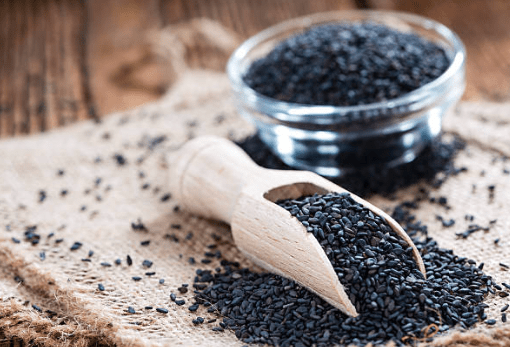How to Eat Nigella Sativa Seeds
Nigella Sativa, also known as black seed or black cumin, has been used for centuries for its medicinal properties. Rumor has it that Nigella Sativa was even found in the tomb of the ancient Egyptian Pharaoh Tutankhamun, signifying its value even in ancient cultures. Black seeds come from the Nigella Sativa plant, which is part of the buttercup family, and is native to Southwest Asia.
Despite their tiny size, these seeds pack a punch in terms of health benefits. From aiding in weight loss to improving respiratory health, and even having anti-cancer properties, the scope of advantages provided by Nigella Sativa is vast. But, why should you incorporate these seeds into your diet, and more importantly, how? The key aspect is not just to eat them, but to consume them correctly. Let’s navigate the ways you can seamlessly add these tiny but mighty seeds to your diet.
History and Benefits of Nigella Sativa
Nigella sativa has a rich history of use in traditional medicine systems such as Ayurveda and Unani. The seeds garnered the nickname ‘seeds of blessing’ for they are believed to possess healing properties for all diseases except death. Scientific research provides us with a myriad of reasons to start including these seeds in our regular diet with their anti-inflammatory, antioxidant, anti-cancer, anti-bacterial, and antiviral properties.
Understanding Nigella Sativa
Before diving into the numerous ways to consume the seeds, it’s important to know why they’re worth eating. Research surveys across years have identified several key benefits of Nigella Sativa seeds. Key compounds such as thymoquinone have been known for anti-inflammatory and antioxidant effects, which contribute to many of their health benefits.
Benefits of Nigella Sativa Seeds
Boosts Immune System: Regular consumption of black seeds can help strengthen your immune response, helping your body fend off infections.
Helps in Weight Loss: These seeds are known to aid in weight loss by regulating blood sugar levels and improving metabolism.
Enhances Respiratory Health: Its anti-inflammatory effects can be particularly beneficial for easing respiratory conditions like asthma.
Supports Liver Function: Nigella Sativa seeds can aid in liver function and help in preventing damage to this vital organ.
Improved Skin Health: With its antioxidant properties, ingesting the seeds can lead to healthier skin by fighting off free radicals.
Disclaimers and Precautions
Before incorporating Nigella Sativa seeds into your diet, consult your doctor, especially if you have underlying health conditions or are currently taking any medications. While these seeds are generally safe for culinary use, taking them in medicinal doses should be supervised by a professional.
Preparing Nigella Sativa Seeds
Before you begin to consume nigella sativa seeds, it is important to know the correct way to prepare them to ensure maximum absorption of the benefits.
Cleaning and Storing Seeds
Before you attempt to eat or cook with the seeds, ensure they are clean. Sift through them to remove any debris or stones.
Store nigella sativa seeds in a cool, dark place ideally in an airtight container to maintain freshness.
Preparing Seeds for Consumption
You can consume the seeds raw or you can heat them lightly. This is known to increase their potency.
Crush the seeds gently to help release their active compounds—this can be achieved using a pestle and mortar or a spice grinder.
Ways to Eat Nigella Sativa Seeds
You can approach eating nigella sativa seeds in numerous ways, from incorporating them into your meals to taking them as a daily supplement.
Using Seeds in Meals
As a Spice with Cooking: Sprinkle them on top of your breads before baking, add nigella seeds to curries, stews and soups, or toss them into salads for that extra crunch and nutty flavor.
Pair with Grains and Legumes: Simple rice dishes can be elevated with a light sprinkle of lightly crushed nigella sativa seeds, as well they pair especially well with legumes such as lentils.
Infuse into Your Teas: Added to teas, it provides a pungent yet soothing flavor. You can boil the seeds and strain them or add powdered seeds to your tea mixture.
Crack an Egg over Them: Adding nigella seeds to omelets or your morning scrambled eggs can start your day with a health boost.
Supplements and Remedies
Oil Form
The oil extracted from nigella sativa seeds keeps the essence of the seeds’ benefits and is the easiest to consume daily.
For Direct Consumption: You can take a teaspoon of the oil directly each morning.
As a Topical Application: Applying the oil also provides localized benefits, aiding in reducing joint pain and skin conditions.
Capsules Form
For those who want to avoid the strong taste, capsules are an excellent alternative. They ease the process of including nigella sativa in your diet by having it in precise doses ready to be swallowed.
Key Recipes with Nigella Sativa Seeds
Whipping up delicious meals with nigella seeds can be an enjoyable and a health-induced affair. Here are two simple yet versatile recipes with nigella seeds.
Nigella Seed Topping for Bread
- 1 tablespoon of olive oil
- 2 tablespoons of nigella sativa seeds
- Pinch of sea salt
Combine the olive oil, seeds, and sea salt. Brush over flatbreads or hearty loaves before baking.
Nigella Seed Salad Dressing
- 3 tablespoons of nigella sativa seed oil
- 1 tablespoon of lemon juice
- 1 garlic clove minced
- Salt and pepper to taste
Whisk together the oil, lemon juice, garlic, salt, and pepper—the perfect dressing for a nutritious, zesty salad.
Precautions & Side Effects
Like any dietary supplement, it’s vital to be aware of any potential side effects. While most individuals can consume the seeds without any adverse reactions, it is crucial to consider the following:
- Always begin with small quantities to ensure you don’t have an allergic reaction.
- While the seeds are natural, they may interfere with certain medications, so consult your healthcare provider if you are on medication or have a medical condition.
- Pregnant and nursing women should seek a doctor’s advice before adding nigella sativa to their diets.
Making Nigella Sativa Part of Your Daily Regimen
Adopting a new health habit takes some getting used to; however, with the versatility of Nigella Sativa, there’s a multitude of ways to make it part of your everyday diet.
Daily Intake Recommendations
It’s advisable to begin with a small quantity to see how your body reacts. A common daily intake is about one teaspoon (5ml) of the seeds or the equivalent in oil form. Incremental adjustments can be made based on personal tolerance.
Recipes
Get creative and start weaving Nigella Sativa into your meals. Given its bitterness, blending the seeds into dishes with strong flavors can mask their taste while still offering all the benefits.
- Nigella Morning Tonic: Start your day with a warming tonic by mixing crushed seeds with warm water, lemon, and a drop of honey.
- Spicy Black Seed Chicken: Make a spice rub for your chicken using ground black seeds, paprika, garlic powder, and salt for an antioxidant-rich entree.
- Herbal Infusion: Create a blend of Nigella Sativa seeds with green tea leaves and steep them for a revitalizing morning brew.
Final Thoughts
As we edge towards a more health-conscious society, natural supplements like Nigella Sativa rise in popularity for good reason. Eating these seeds, whether whole, crushed, or infused in oil, could be a simple yet effective way to bolster your health. With the right approach and knowledge, they can be more than just an occasional dietary supplement—they can become a central health-boosting element within your day-to-day nutrition. Remember, the key to fully reaping the benefits of Nigella Sativa lies in consistency and understanding how to properly incorporate it into your diet. As always, consult with a health professional before making significant changes to your dietary routine, especially if navigating health challenges or existing conditions. Enjoy the potent power of black seeds and let it spark a positive transformation in your health journey.

